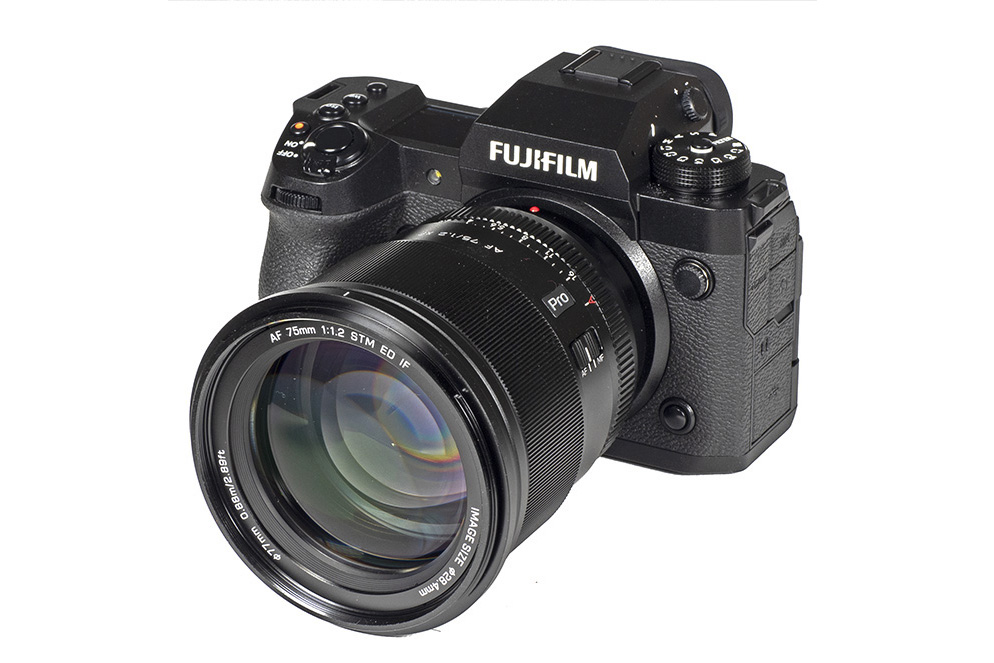Review by Klaus Schroiff, published February 2023
Introduction
Viltrox is a bit of an outlier among Chinese lens manufacturers. Most are trying their luck in certain niches. e.g. Loawa is well-known for ultra-wide and macro lenses while others are bottom feeders. However, Viltrox has a very different approach. They are going for the mainstream market. Their rise to (relative) fame started with a set of APS-C format prime lenses – namely the AF 23mm f/1.4, AF 33mm f/1.4 and AF 56mm f/1.4 both in Sony E and Fujifilm X mount. Later they added a 13mm f/1.4 including one for Nikon Z as well as a set of full-format prime lenses. Despite the high speed, they still managed to keep the retail price very competitive – which brings us to their latest offering, the Viltrox AF 75mm f/1.2 PRO XF. Nothing beats speed, but more speed and f/1.2 is about as fast as it gets in Fujifilm X mount. Yet a price of around $550/600EUR is almost a steal in this lens class.

Unlike previous Viltrox lenses, the 75mm f/1.2 is a designated “PRO” lens, and this isn’t just marketing. The build quality is very good if not exceptional, thanks to a tightly assembled metal body as well as weather-sealing – the latter is a first for a Chinese manufacturer. The lens uses an inner focusing system; thus, the physical length remains constant throughout the focus range. It also features a dedicated, clicked aperture ring. There’s also an MF/AF switch on the lens. The manual focusing ring operates smoothly. Viltrox also included a petal-shaped (plastic) lens hood. Given its impressive specs and high build quality, it’s unsurprising that it’s comparatively big and quite heavy.
As hinted above, the AF 75mm f/1.2 PRO XF is fully coupled so all relevant aspects can be controlled via the camera. EXIF data is provided, making it also compatible with in-camera image stabilization. The lens uses a stepping motor (STM) for auto-focusing. The AF works well, but, typical for STM, it’s not a speed demon. Manual focusing works “by wire” thus, you are driving the AF motor when turning the focus ring in manual mode. Firmware updates are possible via a dedicated USB port on the lens mount.
| Equiv. full-format focal length | “115mm” |
| equiv. full-format aperture (FoV) | “f/1.8” |
| Optical construction | 16 elements in 11 groups (3xED, 4xHR) |
| Number of aperture blades | 11 (rounded) |
| min. focus distance | 0.88m (1:10 max magnification) |
| Dimensions | 87x101mm |
| Weight | 670g |
| Filter size | 77mm |
| Hood | petal-shaped (bayonet mount, supplied) |
| AF motor | Stepping type |
| Other | HD Nano coating (water-resistant), aperture ring, weather-proof, USB Port |
| Available Mounts | Fujifilm X |
Distortion
The Viltrox AF 75mm f/1.2 PRO XF doesn’t require any auto-correction regarding image distortions. The lens is fully corrected as you can see below.
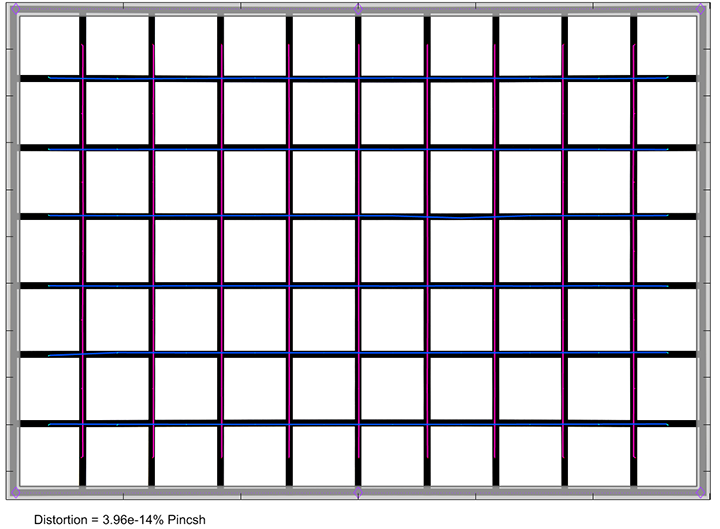
Vignetting
Ultra-high-speed lenses tend to produce quite a bit of vignetting at large apertures, and this also applies to the Viltrox lens. In RAW images, the vignetting is very high (for an APS-C format lens) at f/1.2. A light falloff of ~1.8EV (f-stops) is a bit beyond our usual scale here. Stopping down to f/1.6 reduces the issue substantially, and it’s not a major issue anymore from f/2 onward. Activated auto-correction reduces the vignetting down to 1EV (f-stop) at f/1.2 already and the issue is barely visible from f/1.6 in this case.
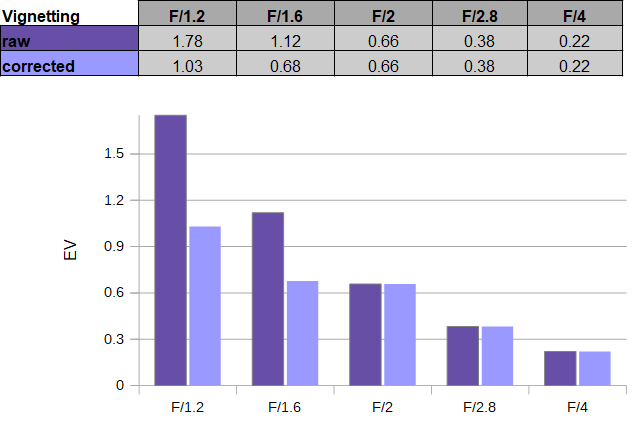
MTF (resolution) at 26 megapixels
Traditionally, such fast lenses struggle a bit when it comes to producing great results at very large aperture settings. However, the Viltrox AF 75mm f/1.2 PRO XF delivers surprisingly high performance at f/1.2 already. The broader center quality is already very good to excellent here, and the border quality is on a good level. The broader center becomes bitingly sharp at f/1.6. It’s safe to state that the center quality surpasses the resolution capabilities of the 26mp sensor at f/2. The outer image field improves only marginally when stopping down with a “late” peak at f/5.6, where it reaches very good results. Diffraction has a dampening impact from f/5.6 and becomes more noticeable from f/8.
The field curvature is low. The centering quality of our sample was decent.
Please note that the MTF results are not directly comparable across the different systems!
Below is a simplified summary of the formal findings. The chart shows line widths per picture height (LW/PH) which can be taken as a measure of sharpness. If you want to know more about the MTF50 figures, you may check out the corresponding Imatest Explanations.

Chromatic Aberrations (CAs)
Lateral CAs are basically non-existent and nothing to worry about.

Bokeh
High resolution is one thing, but if you invest in a fast medium tele lens, you tend to be interested in shallow depth-of-field photography, and the quality of the bokeh should be another decision point in this case, so let’s see what the Viltrox lens can do for you.
Out-of-focus highlights are nicely rendered with a smooth inner disc and basically no outlining at the edges.

At f/1.2, the circular shape of the highlight discs is only maintained in a fairly narrow zone around the center. The highlight shape deteriorates rapidly with pronounced “cat eyes” near the borders/corners. As usual, stopping down broadens the zone of truly circular discs with a broadly corrected zone at f/2. Imperfect corner highlights are still present at f/2.8, though.
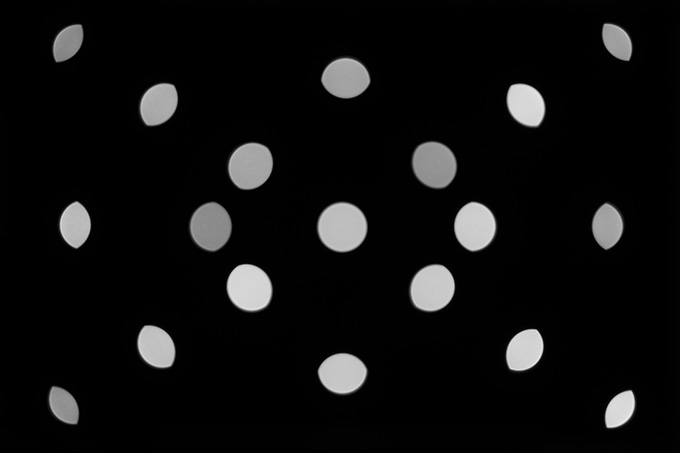
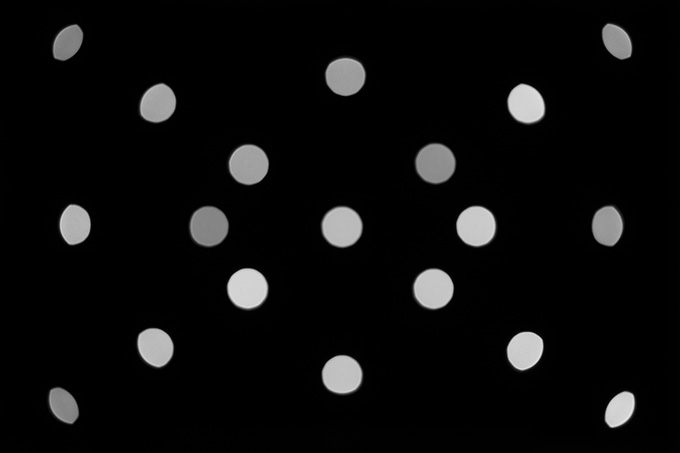

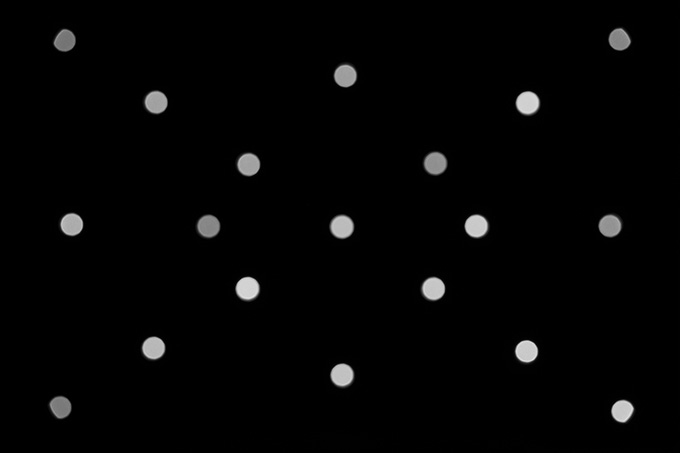
The general blur is very smooth in the background – illustrated to the left below. The less important foreground blur is somewhat less pleasing with a more distinctive blur “edge”.

Bokeh Fringing / LoCA
Boheh fringing/LoCA is an axial color fringing effect with purplish halos in front of the focus point and greenish beyond.
The Viltrox lens does a pretty good job in this respect. There are only traces of color fringing present at f/1.2, and they are gone by f/2 already.
If you scroll through the aperture range, you may notice that the (fixed) focus point moves to the rear. This is a residual spherical aberration (RSA aka focus shift).
However, the “Zero” mark remains quite sharp so it’s not an overly critical issue.
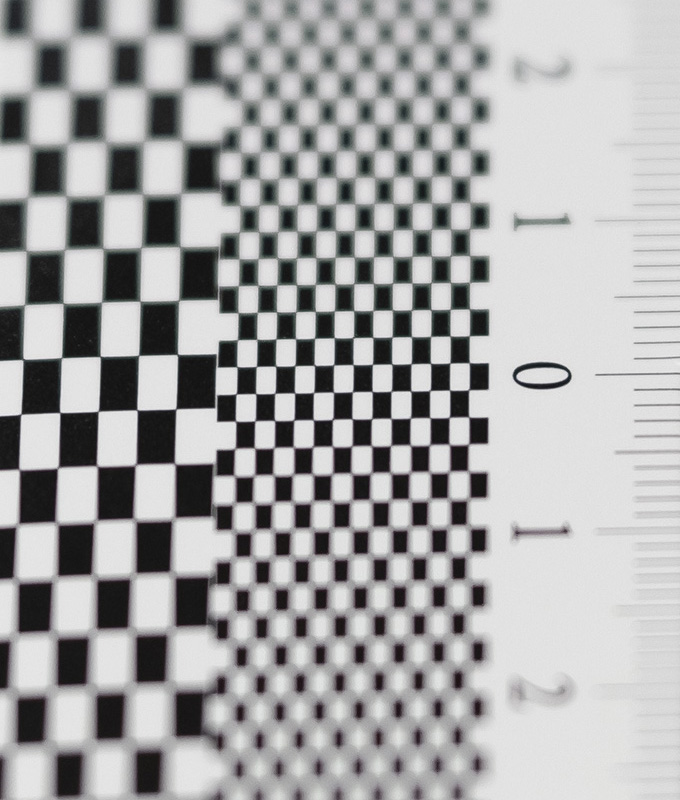

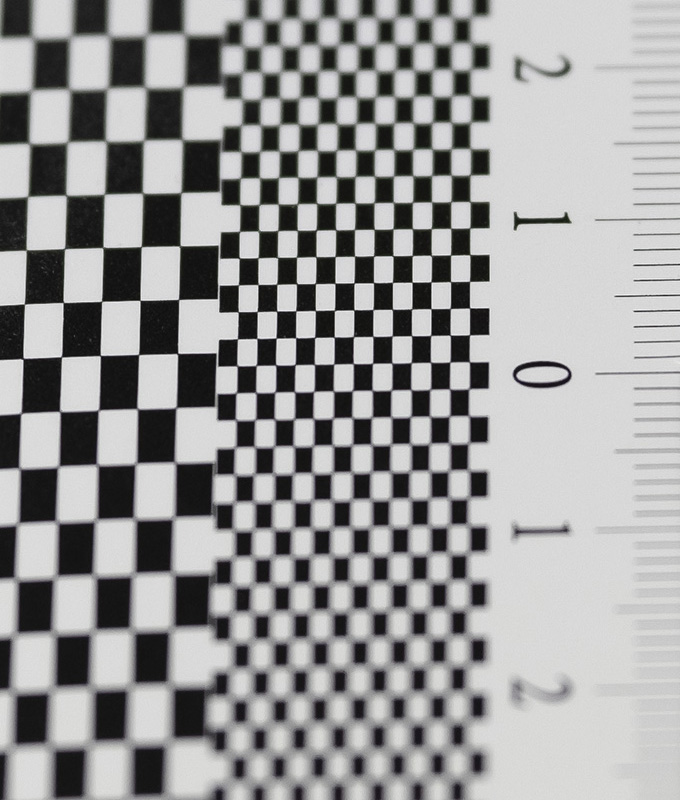
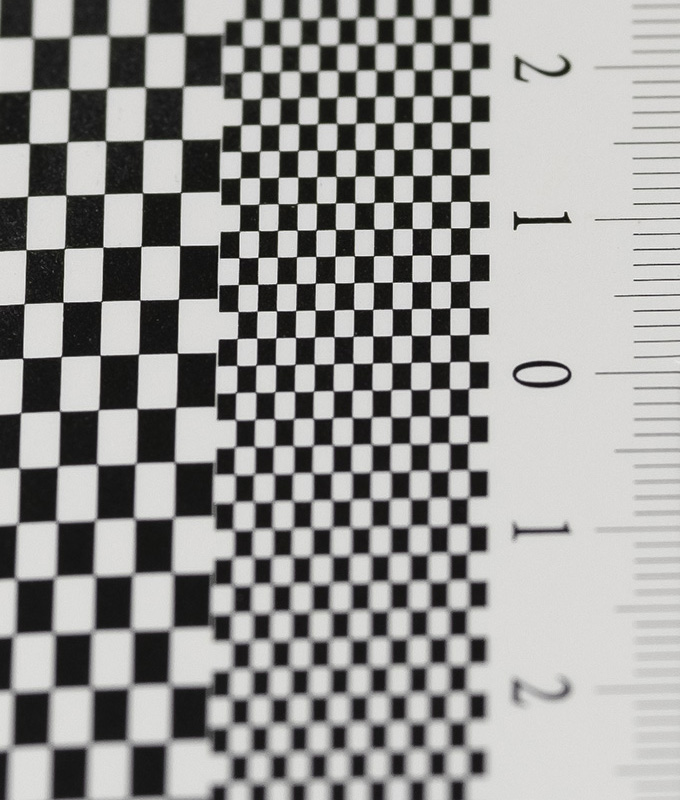
Sun Stars (Experimental)
Below is s sequence of images from f/4 all the way up to f/16 – illustrating the Sunstar behavior (using an LED on a dark background). Sunstars are an aperture effect when shooting bright light sources such as street lights, the sun, etc. The Viltrox lens produces more pronounced sun stars from about f/8, with the best results at f/16. The rays are “pointy,” which is quite pleasing.
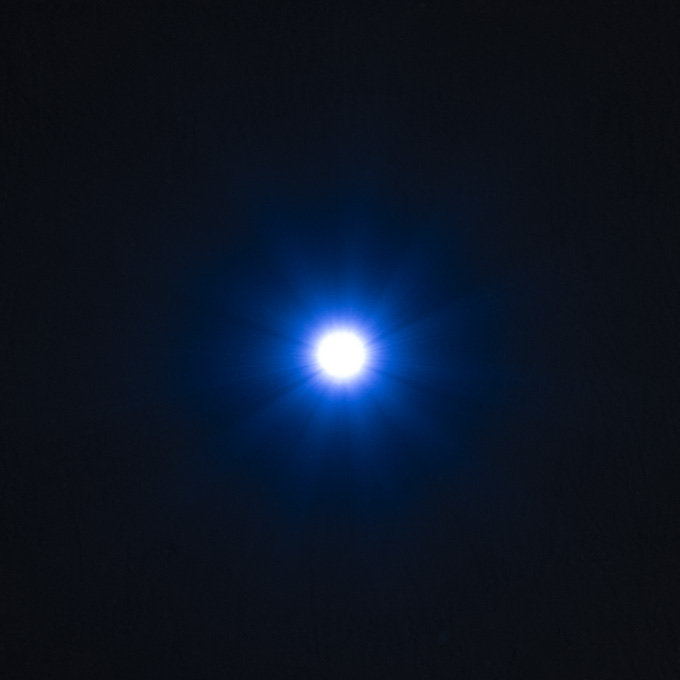
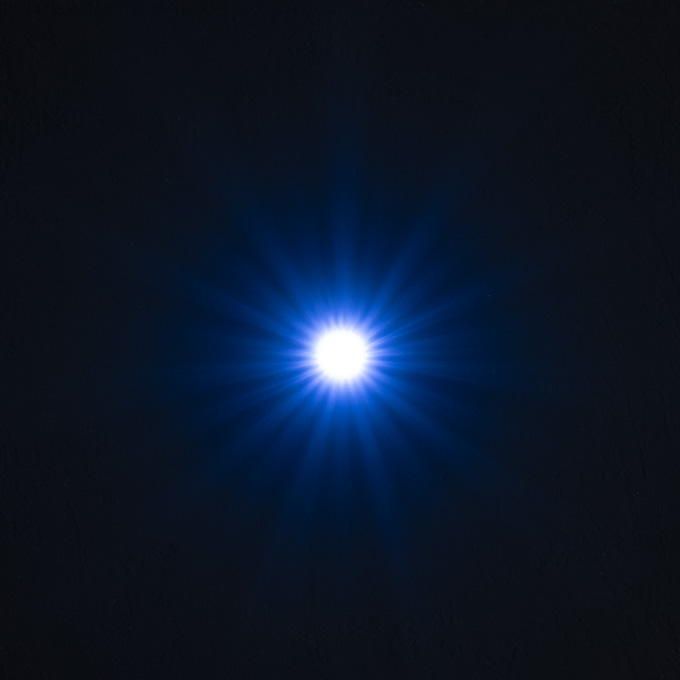

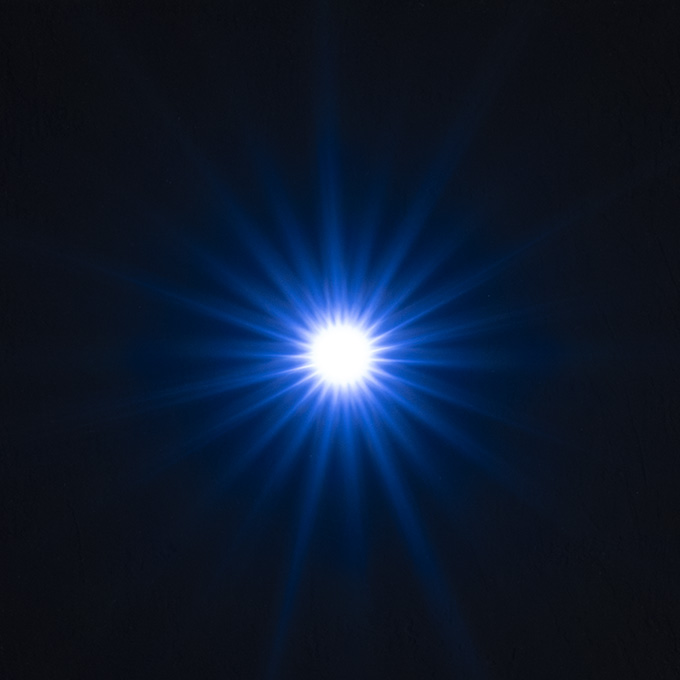
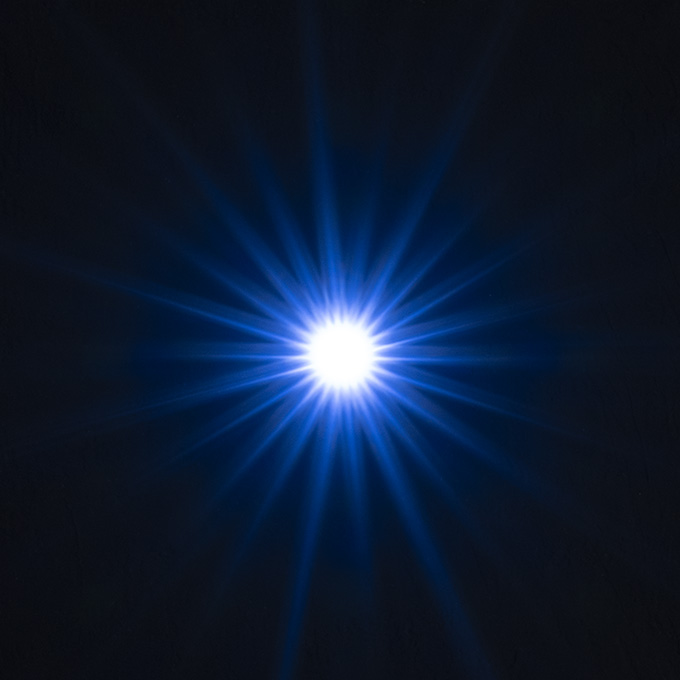
Sample Images
Competition
The Viltrox AF 75mm f/1.2 PRO XF has two main competitors within the Fujifilm camp – the new Fujinon 56mm f/1.2 R WR and the 90mm f/2 R WR. The 90mm f/2 R WR is an outstanding lens, and the new 56mm f/1.2 is certainly no slouch either. However, both are substantially more expensive. The Fujinon XF 90mm f/2 R WR has a linear AF motor, so if you need a really fast AF, it may be a better choice.
The Viltrox AF 75mm f/1.2 PRO XF caused quite a stir when the first rumors emerged. A 75mm f/1.2 lens is quite something after all. And it's not just about the paper specs - the lens is capable of delivering beautiful results. The f/1.2 setting is perfectly usable with a very sharp center quality and pretty good corners/borders. The center is tack sharp at f/1.6. The outer image field doesn't improve that much when stopping down but they have a nice peak quality at f/5.6 if you want to push it. Lateral CAs as well as image distortions are basically absent. Surprisingly, axial CAs (LoCAs) are also very low at f/1.2 and gone from f/2 already. We also didn't notice any purple fringing at large aperture settings. The vignetting is a bit on the high side at f/1.2 but image-auto correction can mostly fix this for you. Besides being capable of producing a very shallow depth-of-field in the first place, the bokeh is also very nice, especially in the image background. Out-of-focus highlights are a bit too prone to producing "cat eyes" though.
Another highlight of the Viltrox lens is its high build quality which is easily on the level of the best Fujinon lenses. The lens feels reassuringly sturdy thanks to a metal body and the inner focusing system. The added weather-sealing also illustrates the high ambitions that Viltrox has with this lens. The lens is fully coupled thus besides producing EXIF data and a camera-controlled aperture, it also features an AF motor. The AF may not be the fastest on the planet but it does a decent job.
The Viltrox is becoming a force to be reckoned with now. Given the degree of refinement of the AF 75mm f/1.2 PRO XF, they are now truly competing with the big boys - at a much lower price. While not perfect in every aspect, it is impressive what the lens can do for you straight from f/1.2. As such, it receives our "highly recommended" badge.
-
Optical Quality
-
Mechanical Quality
-
Price/Performance


